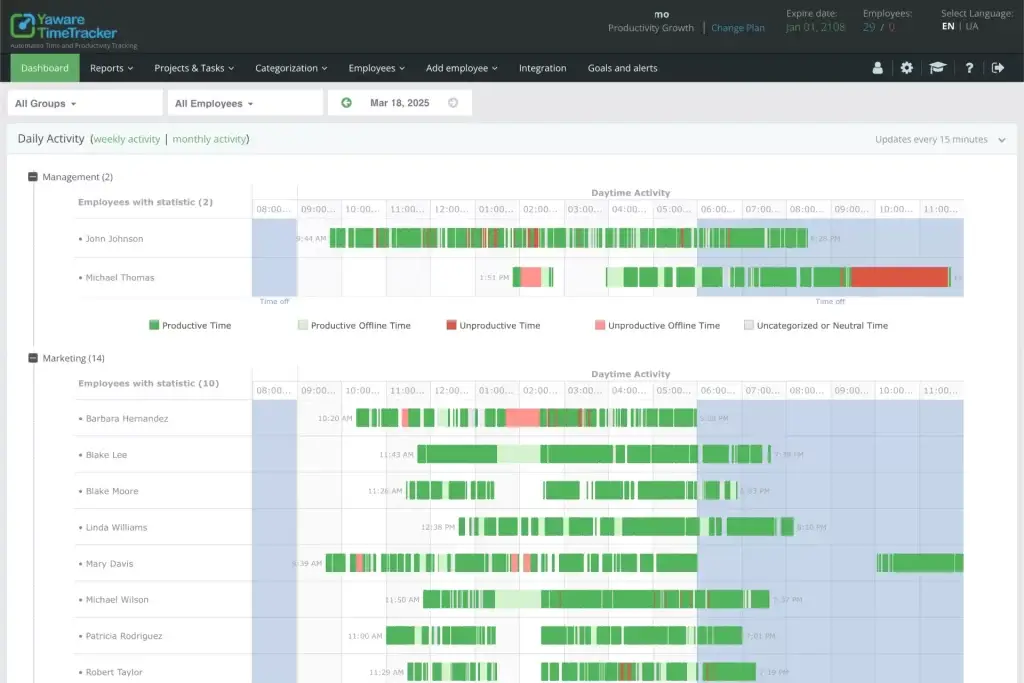Is time tracking legal in the EU?
Yes, time tracking is legal in the EU, but with specific conditions that many organizations overlook. GDPR treats employee work data as personal information, requiring proper legal basis, transparency, and data minimization. Companies must demonstrate legitimate business needs while implementing safeguards that protect employee privacy.
The key requirement is establishing lawful basis for processing-typically legitimate interest rather than consent, since true employee consent is nearly impossible due to employment power imbalances. Organizations must inform employees about what's tracked, why it's necessary, and how data is used.
Consider Spain's €30,000 penalty against a logistics company in 2022 for installing hidden monitoring software without employee notification. The fine demonstrates how routine business practices become privacy violations when implemented without legal foundation. Similar cases across Germany, France, and Italy show consistent regulatory focus on workplace monitoring transparency.
What GDPR requires for employee time tracking
GDPR time tracking compliance centers on five essential requirements that organizations must follow regardless of company size. The regulation emphasizes data protection by design, meaning privacy considerations should be integrated into monitoring systems from the beginning rather than added as an afterthought.
Essential compliance includes establishing genuine business justification for monitoring, providing comprehensive employee notification about data collection, implementing data minimization by collecting only necessary information, ensuring secure data storage with access controls, and establishing retention periods with automatic deletion.
Data Protection Impact Assessments (DPIA) become mandatory when monitoring is systematic, large-scale, or involves vulnerable individuals-criteria that typically apply to workplace time tracking systems.
Five essential rules for legal time tracking under GDPR:
- Document legitimate business interests – Clearly justify why monitoring is necessary for operations, security, or legal compliance
- Inform employees comprehensively – Explain what data is collected, processing purposes, and retention periods
- Minimize data collection – Track only information directly necessary for stated business purposes
- Implement proper security – Use encryption, access controls, and regular security assessments
- Respect employee rights – Enable data access, correction, and deletion when legally appropriate
Proper implementation protects organizations from regulatory penalties while building employee trust in productivity initiatives.
What national labor laws add to GDPR
While GDPR provides the overarching framework, employee monitoring law Europe varies considerably across member states. These national differences affect implementation timelines, employee consultation processes, and documentation requirements that organizations must navigate carefully.
Germany requires works council approval (Betriebsrat) for employee monitoring systems through strict co-determination laws. German organizations need written employee consent for monitoring emails or internet usage, while works councils have blocking power over monitoring implementations.
France mandates CNIL declarations for personal data processing tools. French law requires works council consultation before introducing surveillance technologies and establishes proportionality standards that limit acceptable monitoring scope.
Netherlands emphasizes proportionality requirements, requiring employers to prove that monitoring represents the least intrusive method available for achieving business objectives.
The pattern across jurisdictions is clear: successful implementation requires comprehensive policies, appropriate employee consultation, and clear explanation of monitoring purposes beyond basic GDPR compliance.
What ethical time tracking looks like in the EU
Ethical employee tracking focuses on transparency and employee empowerment rather than surveillance and control. Compliant systems avoid invasive technologies like screen recording, keystroke logging, or detailed computer activity monitoring that regulatory authorities consistently flag as excessive.
Instead, ethical monitoring emphasizes work pattern analysis that employees can understand and access. Teams should know what data is collected, how it benefits productivity, and how they can access their own information through dashboards and reports.
Five ethical features that create trust in EU time tracking:
- Pattern analysis without invasion – Monitor productivity trends without detailed surveillance of individual activities
- Employee dashboard access – Provide transparency through individual data visibility and control
- Clear purpose communication – Explain specific business reasons for data collection and processing
- Minimal data collection – Track only essential information required for stated business purposes
- Secure data handling – Implement strong encryption, access controls, and retention management
This approach creates trust rather than fear, encouraging employee engagement with productivity tools while meeting regulatory requirements. Companies using transparent monitoring consistently report better retention rates and higher team engagement compared to surveillance-based approaches.
How Yaware.TimeTracker complies with EU standards
Yaware.TimeTracker demonstrates practical time tracker GDPR compliant architecture through design decisions that prioritize privacy protection while delivering valuable business insights. The platform avoids invasive monitoring technologies that trigger regulatory scrutiny.

No keystroke logging or screen recording – The system focuses on work patterns without detailed computer activity surveillance. No employee spying – Team members access their own productivity data through transparent dashboards and understand exactly what information is collected.
AI pattern analysis – Advanced analytics identify team optimization opportunities without individual targeting or invasive monitoring. Employee data access – Team members control their data visibility and understand how information supports productivity goals. Transparent communication – Clear messaging about monitoring purposes and data usage builds trust rather than anxiety.
The platform was specifically designed for EU employee data privacy compliance, enabling organizations to support productivity goals while respecting employee rights and regulatory requirements across European jurisdictions.
Final reflection for HR and legal teams
The question for organizations isn't whether to track time, but how to do it ethically and legally. Fear-based approaches to workplace monitoring create compliance risks and damage team relationships, while transparent systems build competitive advantages through improved productivity and retention.
Employee consent monitoring done right becomes a strategic asset rather than a compliance burden. Teams that trust their monitoring systems engage more effectively with productivity optimization, contribute to organizational success, and stay with companies longer.
The enforcement landscape will continue evolving, but the fundamental principle remains constant: treat employee data with respect, communicate clearly about business needs, and implement systems that support rather than undermine team trust and productivity.
Want to see GDPR-compliant tracking in action? Try Yaware.TimeTracker – simple, legal, respectful.

